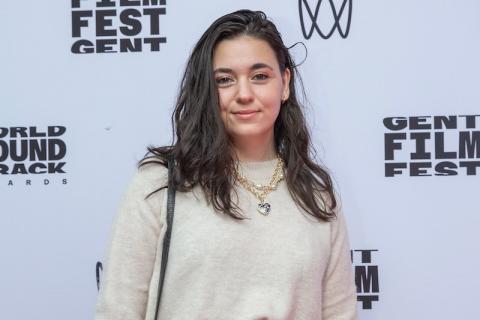EA Scholarship Helps Composer Katie Rupinski Close the Gender Gap in the Game Industry

Image courtesy of Katie Rupinski
Katie Rupinski B.M. ’23 says her experience as the recipient of the Electronic Arts/Berklee Charting Change (formerly Next Gen) Scholarship, which was created to support women and non-cisgender composers, “has been an absolute fever dream of just amazing opportunities. I feel so prepared, because they really jammed it all into a year.”
She pauses after this, and then adds, “Um . . . it wasn't even a year, I guess. It was six months.”
It’s easy to see why she lost track of time. In the space of half a year, Rupinski got a working tour of her field through the scholarship, which is given to one student composer from the Screen Scoring Department each semester, and provides $15,000 and the opportunity to collaborate with the Electronic Arts (EA) team on composing, orchestrating, and arranging an original game score for the company.
Making It Hers
The scholarship’s effectiveness is partly due to the nature of the Berklee/EA partnership, where Berklee’s curriculum and creative environment lays the groundwork and EA builds on that foundation. It was during her stint in Berklee’s Five-Week summer program that Rupinski learned a career could exist in video game music. Once she enrolled in the game audio and interactive media (GAIMS) program, she learned hard skills such as how to program in industry-standard middleware like Wwise and developed her artistry in Claes Nystrom’s Make It Yours class. In fact, she still has daily calls with her old roommate during which they do composition exercises they picked up in Nystrom’s course.
Rupinski was the first recipient of the scholarship, with Carol Gao recently named its next recipient.
“Our commitment to the EA/Berklee scholarship has only just begun,” said Steve Schnur, worldwide executive and president of music at EA. Regarding Rupinski, Schnur added that “Katie is a uniquely talented young composer whose career now has the professional momentum it deserves."
Rupinski is now a production assistant at ROTU Entertainment in Los Angeles, where she relocated after graduation. ROTU (Rhythm of the Universe) is an award-winning media company working in the games, film, TV, and VR industries and led by two Berklee alumni, Emir Cerman B.M. '11, chief creative officer, and Jason Parks B.M. '11, CEO, who is also an assistant professor in the Screen Scoring Department.
Game-Changing Mentorship
The scholarship’s impact extends far beyond the initial program in terms of fostering a long-term mentoring relationship. “They never stop being mentors,” Rupinski says of the EA composers she collaborated with. “[The] connections are made.”
Rupinski worked closely with Gordy Haab and Stephen Barton, both widely acclaimed composers in the film and TV industry in addition to their extensive work in video games, where they have worked together to score games in the Star Wars franchise.
Barton is now working with Rupinski on the next installment of Apex Legends, for which Barton is the main composer. Traditionally, the game doesn’t have music during the actual gameplay, allowing for players to be more attuned to environmental audio cues within the game. “I was talking to [Barton] earlier this year . . . and I said, ‘You know, there's a way to put music [in the game itself],’” Rupinski says. “I pulled out my computer . . . and I showed some music that I had programmed to slowly work into the game, and he goes, ‘Okay. Yeah, let's set up a meeting with the the [game developers]. This is awesome.’”
Listen to a mentorship panel from the 2023 World Soundtrack Awards featuring Rupinski, her mentors Stephen Barton and Gordy Haab, and composers Austin Wintory, Stephanie Economou, Nainita Desai, and moderator Shalini Singh:
Finally Being Heard
Rupinski's participation in the gaming community wasn’t always taken this seriously, which is part of what makes the EA/Berklee partnership so important, which was created with the aim of making the traditionally male-dominated game audio industry more equitable.
Growing up, she loved playing video games, but being a girl often made her feel like an outsider. “I remember I was the annoying girl in Call of Duty,” she says—annoying, that is, simply for being present in a male-dominated space. Rupinski recalls all kinds of unwelcome comments in those games. “It would be like, ‘You just got beat by a girl!’ . . . Immediately people would be yelling or hitting on you. Like, the spectrum is everything but 'you're a person.'"
Rupinski cites her participation in Berklee's Video Game Music Club as key to helping her feel rooted within the gaming community. While she had some concerns about the group’s gender balance going in, she no longer felt like that “annoying girl.” And even in the few years since she joined, the club has made important strides toward parity. “I take no credit for this at all,” she says, “but since I graduated, there are more women than men on the leadership.”
Her experience as a woman in the gaming world is why being not just mentored by people such as Barton, but actually listened to, is such a big deal, says Rupinski: “For him to be like, 'Yeah, I'm going to listen’ and ‘This is a good idea,’ regardless of the fact that I'm a woman, or I just got out of college—he's like, ‘No, this is a solid idea. Let's run with it.’”
